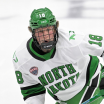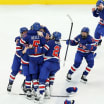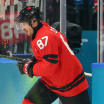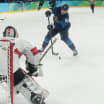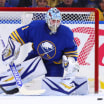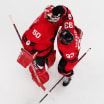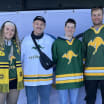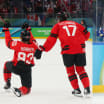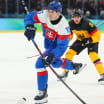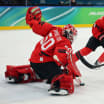When Hayley Wickenheiser pleads for N95 masks to go to medical personnel, when she demonstrates the proper technique for washing your hands, when she asks people to just stay home, none of it is abstract for the Hockey Hall of Famer. It is all personal, and deeply so.
Wickenheiser aiding fight during coronavirus pandemic
Hockey Hall of Famer assisting doctors, using 'front-seat view' to spread proper messages
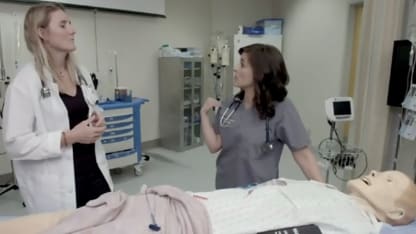
Wickenheiser, the four-time Olympic gold medalist with Canada women's team and the assistant director of player development for the Toronto Maple Leafs, was in her final year of medical school at the University of Calgary when the COVID-19 pandemic swept through North America in recent weeks, pushing the students out of the emergency rooms and into an uncertain space where they are doing all they can to aid their colleagues in the fight.
For the past 2 1/2 months, Wickenheiser and her classmates were doing their rotations, seeing patients, and moving through surgery and internal medicine. Wickenheiser herself was in emergency medicine, where she wants to specialize.
Because she was still in school, she wasn't permitted to personally attend to COVID-19 patients, but she was there. She saw what was happening.
"I saw enough COVID patients come through the doors and I was involved. I had to obviously see a lot of intubation with COVID patients and things like that, but not actually physically treat them myself," Wickenheiser told NHL.com this week from Toronto, where she was doing her rotations. "This is a front-seat view as to how this whole thing has unfolded."
With their rotations pulled for now, Wickenheiser and her classmates are helping in the ways they can, including doing contact tracing -- calling people who have had contact with COVID-19 and advising them to be tested or to self-quarantine -- and assisting doctors on the frontlines of the pandemic.
Because of her unique place in the hockey world, Wickenheiser has been given an additional task, helping the Canada government spread the message about self-isolation and washing your hands, and the correct techniques to keep as many people as healthy as possible.
All while still studying medicine.
At the same time, she's contemplating the possibilities, including being drafted into the fight, like the 10,000 medical school students in Italy who were fast-tracked into becoming doctors to ease the burden on the healthcare system. New York University's medical school also decided this week to allow members of its graduating class to leave to volunteer in internal or emergency medicine departments in response to COVID-19.
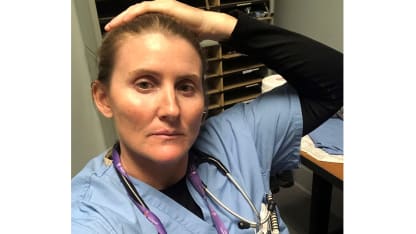
She's mentally prepared for that.
"Yeah, I am," Wickenheiser said. "My skills certainly wouldn't be where an ICU intensive assistant would be, but I'm more than happy to do it. I'll do whatever I can. I think you learn really fast when you have to.
"I've been learning and watching, talking to a lot of my friends who are attending doctors who are out there on the front lines every day as to what they've experiencing. I feel like I've had a significant amount of [emergency department] experience in the last two and a half months that if I had to, if I was asked to go in, I could fill a few holes."
It was only a few weeks ago that Wickenheiser started to really understand what was coming. She had a conversation with swimmer Kirsty Coventry, who is a seven-time Olympic medalist, the minister of youth, sport, arts and recreation in Zimbabwe, and chair of the International Olympic Committee Athletes' Commission, in which they talked about how the virus wouldn't be too bad, about how it would be over by July, about how the Olympics would go on.
"At about that time, two or three weeks ago now, I started to feel a shift in the emerg where the docs and nurses that I was working with went from, 'Yeah, there's this COVID thing,' light acuity coming through the door to starting to have anxiety about going in the room not fully gown, glove and mask, talking to patients on cell phones, how to manage this, how to manage people just walking into the emerg with COVID-like symptoms, and I started to think, this isn't going well," Wickenheiser said.
She saw a patient come to the emergency room, an almost 40-year-old pilot, who had to be intubated because of COVID-19. At the same time, those conversations with her friends turned more serious, more worried. A friend who works in intensive care and had dealt with the SARS pandemic in 2003 told Wickenheiser, "This is a crisis like no other."
"The accumulation of all of that really just made me go, 'Holy crap,'" Wickenheiser said.
She posted her opinion on social media that the Olympics could not go on as scheduled. Two days ago, it was announced that the 2020 Tokyo Olympics would be pushed back.
The effects started becoming more and more real. There was unease when she walked into the hospital. There was tension.
"I had a situation a couple weeks ago where I couldn't find an N95 mask that fit me properly and I had to grab a different one, which is useless really anyway," Wickehnheiser said. "So I started to be experiencing what everybody is experiencing now in there before they yanked us out.
"So there's some anxiety and stress and uncertainty. Everybody's just bracing for hopefully what isn't going to come, but what may come."
Wickenheiser carries a card that shows that she's been fitted for an N95 mask. It goes on her lanyard when she's in the hospital. Under normal circumstances, it's not used very often. But a few weeks ago, she had to pull it out. She had to know her size: 1870+. They didn't have it.
"It's real," Wickenheiser said. "The personal protective wear. I had to go back and rewatch videos about how to don and doff the gear properly because you're at more risk of getting infected when you're taking that stuff off. So I wanted to really make sure I was doing it right. You forget stuff like that. You get lazy. And the fear of God from your attending doctors that you don't mess around with this stuff."
That's why she has made sure to get the message out, to warn people. She was at it again on Wednesday while doing an Instagram live video from her basement home gym to show off some training techniques and drills that kids could do at home while in self-isolation.
She was trying to help stem the boredom. She was trying to get out the message to be safe, to stay at home, to imagine that you have the virus and act accordingly -- wash your hands, sanitize surfaces, avoid others.
That's what she wants people to understand. This isn't a joke. This isn't something to be casual about. Because her life and the lives of her friends and classmates could be on the line.
"I come from hockey, it's a team sport, right?" Wickenheiser said. "The best teams are the most unselfish, they sacrifice for each other. That's how you win in this game. The only way that we're going to beat this is people are unselfish. It [stinks] to stay home when you're feeling great and feel like you can go out.
"But people need to stay home. People need to listen to the healthcare experts. By doing that, you are saving lives you don't even know. … Who we're doing this for is my best friend who has stage 4 cancer right now, undergoing chemo, or my niece who's immunocompromised, or my parents who are in their 70s. We all have somebody in our life.
"If you don't want to do it for yourself, think about somebody else."

